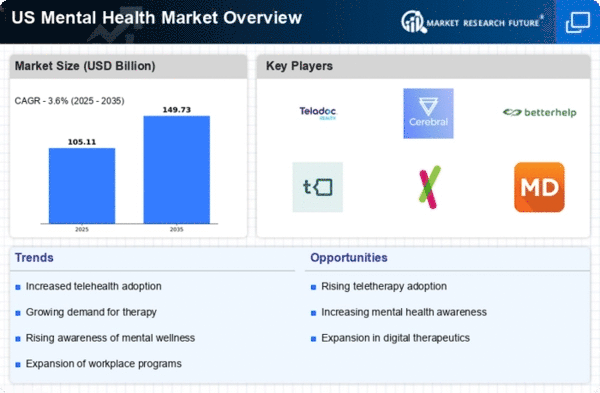Demographic Shifts and Diverse Needs
Demographic shifts in the US population are influencing the mental health market. As the population becomes more diverse, the demand for culturally competent mental health services is increasing. Data indicates that minority groups often face unique mental health challenges and barriers to accessing care. This has prompted mental health providers to adapt their services to meet the needs of various cultural backgrounds. The mental health market is thus evolving to include a wider range of services that cater to these diverse populations, potentially leading to increased market growth as more individuals find appropriate support.
Policy Changes and Legislative Support
Recent policy changes and legislative support are emerging as crucial drivers for the mental health market. The US government has implemented various initiatives aimed at improving mental health care access and funding. For example, the Mental Health Parity and Addiction Equity Act mandates that mental health services be covered by insurance plans at the same level as physical health services. This legislative support is likely to increase the number of individuals seeking treatment, as financial barriers are reduced. Consequently, the mental health market is poised for growth, with more resources allocated to mental health services and programs.
Technological Advancements in Treatment
Technological advancements are significantly influencing the mental health market. Innovations such as mobile applications, virtual reality therapy, and artificial intelligence-driven chatbots are transforming how mental health services are delivered. For instance, the use of teletherapy platforms has increased by over 30% in recent years, providing accessible treatment options for those who may not have sought help otherwise. These technologies not only enhance the efficiency of treatment but also cater to a younger demographic that prefers digital solutions. As technology continues to evolve, it is expected that the mental health market will expand further, offering diverse and effective treatment modalities.
Rising Awareness of Mental Health Issues
The increasing awareness surrounding mental health issues is a pivotal driver for the mental health market. Campaigns aimed at destigmatizing mental health conditions have gained traction, leading to a greater number of individuals seeking help. According to recent data, approximately 1 in 5 adults in the US experience mental illness each year, which translates to around 51.5 million people. This heightened awareness encourages individuals to pursue treatment options, thereby expanding the market. Furthermore, educational initiatives in schools and workplaces are fostering environments where mental health discussions are normalized. As a result, The mental health market is likely to see a surge in demand for services designed to address these needs.
Increased Focus on Workplace Mental Health
The growing emphasis on workplace mental health is reshaping the mental health market. Employers are increasingly recognizing the importance of mental well-being in enhancing productivity and employee satisfaction. As a result, many organizations are implementing mental health programs and resources, which has led to a reported 25% increase in employee engagement in companies that prioritize mental health. This trend not only benefits employees but also contributes to a healthier work environment, ultimately driving demand for mental health services. The mental health market is likely to see a rise in corporate partnerships and initiatives aimed at fostering mental wellness in the workplace.
















